This article was co-authored by Zora Degrandpre, ND and by wikiHow staff writer, Janice Tieperman. Dr. Zora Degrandpre is a Natural Health Doctor and Licensed Naturopathic Physician in Vancouver, Washington. She is a grant reviewer for the National Institutes of Health and the National Center for Complementary and Alternative Medicine. She received her ND from the National College of Natural Medicine in 2007.
There are 9 references cited in this article, which can be found at the bottom of the page.
wikiHow marks an article as reader-approved once it receives enough positive feedback. This article received 15 testimonials and 84% of readers who voted found it helpful, earning it our reader-approved status.
This article has been viewed 787,630 times.
Believe it or not, castor oil is a natural remedy for constipation. As a stimulant laxative, which causes your bowel muscles to contract, it can produce a bowel movement in small doses.[1] If you aren’t having much luck with traditional laxatives, castor oil may help relieve your symptoms, but keep in mind that it may cause cramping and other unpleasant side effects.[2] While you should always consult a doctor if you’ve had long-lasting constipation or are experiencing severe symptoms, castor oil may provide you with some relief if you’re looking for a quick solution.
Steps
Drinking Castor Oil
-
1Take one 15 to 60 mL (1.0 to 4.1 US tbsp) dose of castor oil. Visit your local pharmacy or supermarket and pick up a bottle of castor oil. Check the side of the bottle for specific dosage instructions for different age groups. As a general rule of thumb, adults over the age of 12 can take 15 to 60 millilitres (1.0 to 4.1 US tbsp) of castor oil in 1 dose, while kids between ages 2 and 11 should only take between 5 to 15 millilitres (0.18 to 0.53 imp fl oz; 0.17 to 0.51 fl oz).[3]
- Infants and toddlers under the age of 2 should only take 1 to 5 millilitres (0.068 to 0.338 US tbsp).
- If you’re using castor oil on a doctor’s recommendation, follow their dosing instructions.
Warning: Don’t use castor oil if you’re pregnant, nursing, or on your period.[4]
-
2Take castor oil on an empty stomach in the morning or afternoon. Find time before breakfast or lunch to take your recommended dose. Note that castor takes 2 to 6 hours to stimulate a bowel movement, so you don’t want to take any before bed.[5]
- If you want the castor oil to work slowly over time, take it with a meal.
Advertisement -
3Drink flavored castor oil or mix it with juice to mask the taste. Fill a glass with your favorite juice, then use a special measuring spoon or cup to pour in the recommended dose of oil. Mix both ingredients together, and drink the entire glass to get the full effects of the oil. If you’re taking flavored castor oil, drink the traditionally recommended dosage.[6]
- You can also improve the taste by refrigerating the castor oil for an hour or so beforehand.
- You can find flavored castor oil online. It can come in fruity flavors, like lemon.
-
4Expect a bowel movement within 2-6 hours. Castor oil often works in as little as 2-3 hours, but it could take as long as 6 hours. Use the restroom as soon as you feel the urge to go.[7]
- Call your doctor if you don't have a bowel movement at this time, as you may have a more serious problem like an intestinal blockage or impaction.
Warning: Only use castor oil when you absolutely need to. If you use stimulant laxatives too much, you may not be able to pass bowel movements on your own.[8]
-
5Store your leftover castor oil in a cool, dry place. Find a cabinet or other cool spot where you can keep your oil without it overheating. Before using the oil again, check the label to make sure that it hasn’t expired.[9]
- Keep your castor oil in a space that’s cooler than 40 °C (104 °F).[10]
- If your oil smells rancid, throw it out.
Seeking Medical Care
-
1Check with your doctor or pharmacist before taking castor oil. Set up an appointment or consultation so you can ask a healthcare professional for a second opinion. While at the appointment, review your history of constipation, discuss your unique needs, and figure out if is the right treatment for you.[11]
- Tell your doctor or pharmacist about any allergies you may have. Castor oil contains certain ingredients that may trigger an allergic reaction.
-
2Ask your doctor if castor oil will interfere with any of your medications. Mention your current prescriptions, especially any blood-thinners, antibiotics, or bone and heart medications. Depending on your medical regimen, you may not want to take castor oil for your constipation.[12]
-
3See your doctor if your constipation lasts longer than a week. If you haven’t had a bowel movement for 7 days, you need to see your doctor even if you’re treating constipation. You may have a more serious condition, or constipation could cause serious complications.[13] Note that your doctor may recommend a special procedure, depending on your symptoms.[14]
- Your doctor may do an X-ray, colonoscopy, or other procedure, depending on what they think is causing your constipation.
-
4Call your doctor if you have side effects like vomiting, cramps, and diarrhea. You may be able to use castor oil without experiencing side effects, however, it’s possible that you will notice some abdominal pain, cramps, nausea, diarrhea, vomiting, or fatigue. Fortunately, these symptoms usually fade quickly once the castor oil is out of your system.[15]
- If you experience any bad abdominal cramps, bloating, vomiting, or dizziness, stop using castor oil immediately and contact a healthcare professional.[16]
Expert Q&A
Did you know you can get premium answers for this article?
Unlock premium answers by supporting wikiHow
-
QuestionCan castor oil be used for infants?
 Zora Degrandpre, NDDr. Zora Degrandpre is a Natural Health Doctor and Licensed Naturopathic Physician in Vancouver, Washington. She is a grant reviewer for the National Institutes of Health and the National Center for Complementary and Alternative Medicine. She received her ND from the National College of Natural Medicine in 2007.
Zora Degrandpre, NDDr. Zora Degrandpre is a Natural Health Doctor and Licensed Naturopathic Physician in Vancouver, Washington. She is a grant reviewer for the National Institutes of Health and the National Center for Complementary and Alternative Medicine. She received her ND from the National College of Natural Medicine in 2007.
Natural Health Doctor You should NOT give oral (by mouth) castor oil to infants. Most breast fed babies do not get constipated very often. Constipation is more common in formula-fed infants. Whether your baby is breast-fed or formula fed, call your physician for advice for constipation in infants. One thing you can try is to gently massage your baby's tummy. You can also rub castor oil on your baby's tummy-- but call your physician first.
You should NOT give oral (by mouth) castor oil to infants. Most breast fed babies do not get constipated very often. Constipation is more common in formula-fed infants. Whether your baby is breast-fed or formula fed, call your physician for advice for constipation in infants. One thing you can try is to gently massage your baby's tummy. You can also rub castor oil on your baby's tummy-- but call your physician first. -
QuestionCan laxatives be used for weight loss?
 Zora Degrandpre, NDDr. Zora Degrandpre is a Natural Health Doctor and Licensed Naturopathic Physician in Vancouver, Washington. She is a grant reviewer for the National Institutes of Health and the National Center for Complementary and Alternative Medicine. She received her ND from the National College of Natural Medicine in 2007.
Zora Degrandpre, NDDr. Zora Degrandpre is a Natural Health Doctor and Licensed Naturopathic Physician in Vancouver, Washington. She is a grant reviewer for the National Institutes of Health and the National Center for Complementary and Alternative Medicine. She received her ND from the National College of Natural Medicine in 2007.
Natural Health Doctor Laxatives should NOT be used for weight loss. For one thing, it doesn't work! Think of it this way-- we get calories from the food we eat. By the time the food has reached the bowels, all the calories have been eaten and used--or stored as fat. Its too late! The only way to lose weight is to reduce the calorie intake with healthy foods while increasing the calorie output by exercising more.
Laxatives should NOT be used for weight loss. For one thing, it doesn't work! Think of it this way-- we get calories from the food we eat. By the time the food has reached the bowels, all the calories have been eaten and used--or stored as fat. Its too late! The only way to lose weight is to reduce the calorie intake with healthy foods while increasing the calorie output by exercising more. -
QuestionIs it better to use castor oil while I use albendazole?
 Zora Degrandpre, NDDr. Zora Degrandpre is a Natural Health Doctor and Licensed Naturopathic Physician in Vancouver, Washington. She is a grant reviewer for the National Institutes of Health and the National Center for Complementary and Alternative Medicine. She received her ND from the National College of Natural Medicine in 2007.
Zora Degrandpre, NDDr. Zora Degrandpre is a Natural Health Doctor and Licensed Naturopathic Physician in Vancouver, Washington. She is a grant reviewer for the National Institutes of Health and the National Center for Complementary and Alternative Medicine. She received her ND from the National College of Natural Medicine in 2007.
Natural Health Doctor
Warnings
Things You'll Need
Taking Castor Oil Orally
- Castor oil
- Measuring spoon or cup
- Glass
- Juice (optional)
References
- ↑ https://www.health.harvard.edu/diseases-and-conditions/dont-bomb-the-bowel-with-laxatives
- ↑ http://www.ncbi.nlm.nih.gov/pmc/articles/PMC3348737/
- ↑ https://www.drugs.com/monograph/castor-oil.html
- ↑ https://www.drugs.com/monograph/castor-oil.html
- ↑ http://www.mayoclinic.org/drugs-supplements/laxative-oral-route/proper-use/drg-20070683
- ↑ https://www.mayoclinic.org/drugs-supplements/laxative-oral-route/proper-use/drg-20070683
- ↑ http://www.mayoclinic.org/drugs-supplements/laxative-oral-route/proper-use/drg-20070683
- ↑ https://familydoctor.org/laxatives-otc-products-for-constipation/
- ↑ https://familydoctor.org/laxatives-otc-products-for-constipation/
- ↑ https://www.drugs.com/monograph/castor-oil.html
- ↑ https://familydoctor.org/laxatives-otc-products-for-constipation/
- ↑ https://familydoctor.org/laxatives-otc-products-for-constipation/
- ↑ https://health.clevelandclinic.org/how-to-know-when-constipation-is-an-emergency/
- ↑ https://www.mayoclinic.org/diseases-conditions/constipation/diagnosis-treatment/drc-20354259
- ↑ https://www.drugs.com/monograph/castor-oil.html
- ↑ https://www.ncbi.nlm.nih.gov/books/NBK551626/
- ↑ https://www.mayoclinic.org/diseases-conditions/constipation/diagnosis-treatment/drc-20354259
- ↑ https://www.drugs.com/monograph/castor-oil.html
- ↑ https://www.drugs.com/monograph/castor-oil.html
About This Article
If you want to relieve your constipation with castor oil, make sure to take the proper dosage, which is 15 to 60 milliliters for anyone over 12, 5 to 15 milliliters for children between the ages of 2 and 11, and 1 to 5 milliliters for children younger than 2 years old. To feel the effects of castor oil quickly, take it on an empty stomach, which will get it into your system faster. Since castor oil has a notoriously bitter taste, mix it with some cranberry or orange juice to make it more pleasant. 2 to 3 hours after taking castor oil, expect to have a bowel movement, so use the restroom as soon as you feel the urge to go. If you don’t have a bowel movement after 6 hours, talk to your doctor as you might have a more serious issue. For more help from our Medical co-author, like how to use castor oil over a longer period of time, read on.


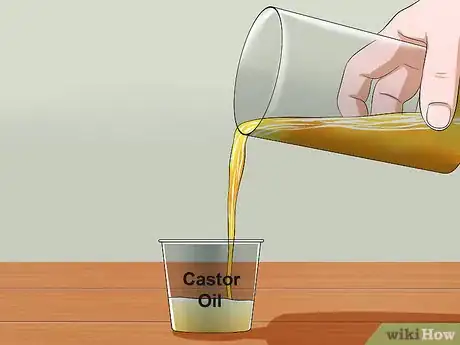
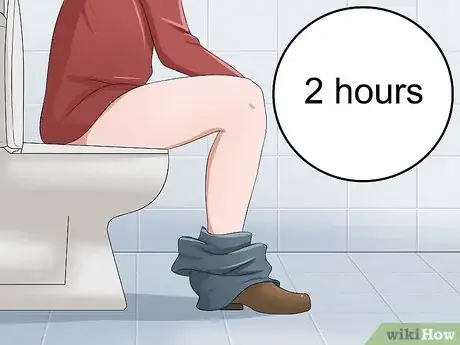
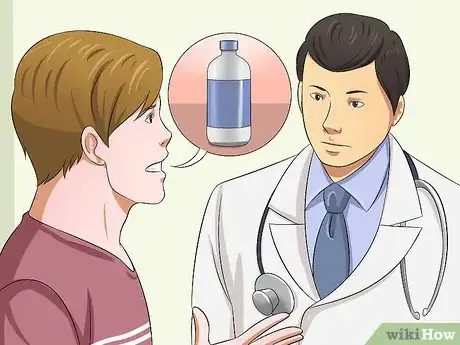



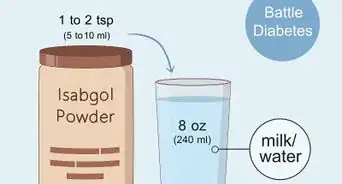
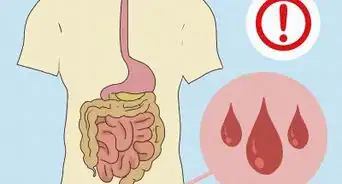



















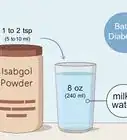
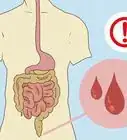




































Medical Disclaimer
The content of this article is not intended to be a substitute for professional medical advice, examination, diagnosis, or treatment. You should always contact your doctor or other qualified healthcare professional before starting, changing, or stopping any kind of health treatment.
Read More...